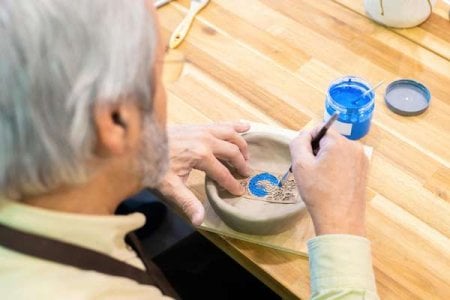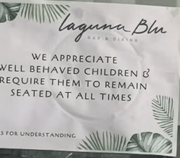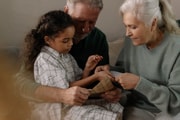Discover the Heartwarming Secret: How Art and Music Therapy Are Transforming Lives of Dementia Patients!
By
Danielle F.
- Replies 5
In the golden years of life, when memories should be cherished like precious jewels, some Australians find themselves in a battle with dementia, a condition that can cloud the mind and dim the sparkle of recollection. On the Gold Coast, however, a ray of hope shines through the fog of this challenging disease, thanks to the transformative power of art and music therapy.
Bob Hall, a former judge and barrister, was diagnosed with dementia six years ago. As his cognitive abilities have steadily declined, he's become one of the estimated 421,000 Australians living with the condition in 2024—a number that Dementia Australia predicts will nearly double by 2054. The impact on Mr. Hall's life has been profound, with feelings of frustration and loneliness becoming more pronounced. Yet, an arts program run by Dementia Australia has offered him a respite from the daily struggles.
'I don't really call it art, I call it physical therapy,' Mr. Hall explains. His approach to art is unique, turning what many would consider junk into pop art-esque creations. One of his standout pieces is a walking frame adorned with wrappers from coffee-flavoured lollies—a testament to his ingenuity and sense of humor. This creative outlet has become a vital part of his routine, helping to alleviate the loneliness and cognitive difficulties associated with dementia. 'If you can just forget about those things, you can still enjoy life,' he says.
Barbara Plume, a former real estate agent diagnosed with Alzheimer's in 2014, has also found solace in creativity. She encourages others to simply pick up a crayon and start scribbling, as she's discovered that the act of creating can significantly lift one's mood.
Dementia is a brain condition that affects mood, memory, and behavior, and is the second leading cause of death in Australia. It is not a normal part of ageing, and early signs include trouble with familiar tasks, memory issues, confusion about time and place, and a lack of motivation. Dementia Australia emphasizes that getting a diagnosis involves speaking to a doctor and undergoing cognitive tests, and they urge those affected to seek support.
The organization has designed programs to combat loneliness, encourage creativity, and promote physical activity. Tenille Griffiths, Dementia Australia's Queensland manager, highlights that their art program gives participants a sense of purpose. 'Dementia is a hidden disease—it's not like cancer that's spoken about quite a lot,' she says. 'It can be quite isolating and people don't know what to do or say.'
In addition to art therapy, the Inspire Dementia Choir meets every fortnight in a small Gold Coast community hall, bringing together about 100 people. Created by Jan Gillies after her sister was diagnosed with Alzheimer's, the choir has grown from a group of enthusiastic amateurs to a full ensemble with a choir director and musicians. The choir provides a space where members can express themselves through song, even when verbal communication may be a challenge. 'There are some members who sing very well, even solo but aren't able to conduct a conversation,' Ms. Gillies shares. 'Another lady, she's totally non-verbal and she simply smiles, she just lights up.'

At the Seniors Discount Club, we celebrate these heartwarming initiatives that bring smiles to the faces of those living with dementia. We encourage our readers to share their experiences with art and music therapy, or to consider how such programs might benefit their loved ones. Have you witnessed the positive effects of these therapies? Do you know of similar programs that are making a difference in the lives of seniors? Join the conversation and let us know in the comments below. Together, we can spread the word about the healing power of creativity and song.
Bob Hall, a former judge and barrister, was diagnosed with dementia six years ago. As his cognitive abilities have steadily declined, he's become one of the estimated 421,000 Australians living with the condition in 2024—a number that Dementia Australia predicts will nearly double by 2054. The impact on Mr. Hall's life has been profound, with feelings of frustration and loneliness becoming more pronounced. Yet, an arts program run by Dementia Australia has offered him a respite from the daily struggles.
'I don't really call it art, I call it physical therapy,' Mr. Hall explains. His approach to art is unique, turning what many would consider junk into pop art-esque creations. One of his standout pieces is a walking frame adorned with wrappers from coffee-flavoured lollies—a testament to his ingenuity and sense of humor. This creative outlet has become a vital part of his routine, helping to alleviate the loneliness and cognitive difficulties associated with dementia. 'If you can just forget about those things, you can still enjoy life,' he says.
Barbara Plume, a former real estate agent diagnosed with Alzheimer's in 2014, has also found solace in creativity. She encourages others to simply pick up a crayon and start scribbling, as she's discovered that the act of creating can significantly lift one's mood.
Dementia is a brain condition that affects mood, memory, and behavior, and is the second leading cause of death in Australia. It is not a normal part of ageing, and early signs include trouble with familiar tasks, memory issues, confusion about time and place, and a lack of motivation. Dementia Australia emphasizes that getting a diagnosis involves speaking to a doctor and undergoing cognitive tests, and they urge those affected to seek support.
The organization has designed programs to combat loneliness, encourage creativity, and promote physical activity. Tenille Griffiths, Dementia Australia's Queensland manager, highlights that their art program gives participants a sense of purpose. 'Dementia is a hidden disease—it's not like cancer that's spoken about quite a lot,' she says. 'It can be quite isolating and people don't know what to do or say.'
In addition to art therapy, the Inspire Dementia Choir meets every fortnight in a small Gold Coast community hall, bringing together about 100 people. Created by Jan Gillies after her sister was diagnosed with Alzheimer's, the choir has grown from a group of enthusiastic amateurs to a full ensemble with a choir director and musicians. The choir provides a space where members can express themselves through song, even when verbal communication may be a challenge. 'There are some members who sing very well, even solo but aren't able to conduct a conversation,' Ms. Gillies shares. 'Another lady, she's totally non-verbal and she simply smiles, she just lights up.'
The sight of the choir is one of joy and connection, with smiles, movement, and interaction that are beneficial for all involved. It's a poignant reminder that beyond the reach of dementia's shadow, the human spirit can still shine brightly through the universal languages of art and music.
Key Takeaways
- Bob Hall, a former judge and barrister on the Gold Coast diagnosed with dementia six years ago, has found relief in an arts therapy program run by Dementia Australia.
- The program offers patients with dementia an opportunity to engage in creative activities, combatting feelings of isolation and cognitive difficulties.
- Dementia, a condition impacting mood, memory, and behaviour, is not a normal part of ageing and is the second leading cause of death in Australia.
- The Inspire Dementia Choir on the Gold Coast, created by Jan Gillies, brings together around 100 people every fortnight, offering a space for community, music, and joy.








